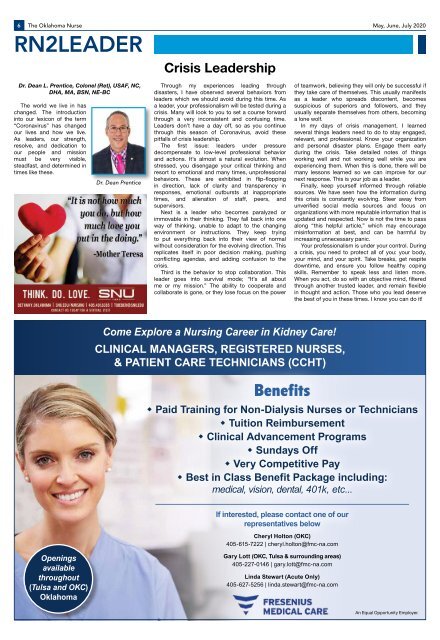The Oklahoma Nurse - May 2020
- No tags were found...
Create successful ePaper yourself
Turn your PDF publications into a flip-book with our unique Google optimized e-Paper software.
6<br />
<strong>The</strong> <strong>Oklahoma</strong> <strong>Nurse</strong> <strong>May</strong>, June, July <strong>2020</strong><br />
RN2LEADER<br />
Dr. Dean L. Prentice, Colonel (Ret), USAF, NC,<br />
DHA, MA, BSN, NE-BC<br />
<strong>The</strong> world we live in has<br />
changed. <strong>The</strong> introduction<br />
into our lexicon of the term<br />
“Coronavirus” has changed<br />
our lives and how we live.<br />
As leaders, our strength,<br />
resolve, and dedication to<br />
our people and mission<br />
must be very visible,<br />
steadfast, and determined in<br />
times like these.<br />
Dr. Dean Prentice<br />
Crisis Leadership<br />
Through my experiences leading through<br />
disasters, I have observed several behaviors from<br />
leaders which we should avoid during this time. As<br />
a leader, your professionalism will be tested during a<br />
crisis. Many will look to you to set a course forward<br />
through a very inconsistent and confusing time.<br />
Leaders don’t have a day off, so as you continue<br />
through this season of Coronavirus, avoid these<br />
pitfalls of crisis leadership.<br />
<strong>The</strong> first issue: leaders under pressure<br />
decompensate to low-level professional behavior<br />
and actions. It’s almost a natural evolution. When<br />
stressed, you disengage your critical thinking and<br />
resort to emotional and many times, unprofessional<br />
behaviors. <strong>The</strong>se are exhibited in flip-flopping<br />
in direction, lack of clarity and transparency in<br />
responses, emotional outbursts at inappropriate<br />
times, and alienation of staff, peers, and<br />
supervisors.<br />
Next is a leader who becomes paralyzed or<br />
immovable in their thinking. <strong>The</strong>y fall back into one<br />
way of thinking, unable to adapt to the changing<br />
environment or instructions. <strong>The</strong>y keep trying<br />
to put everything back into their view of normal<br />
without consideration for the evolving direction. This<br />
replicates itself in poor decision making, pushing<br />
conflicting agendas, and adding confusion to the<br />
crisis.<br />
Third is the behavior to stop collaboration. This<br />
leader goes into survival mode; “It’s all about<br />
me or my mission.” <strong>The</strong> ability to cooperate and<br />
collaborate is gone, or they lose focus on the power<br />
of teamwork, believing they will only be successful if<br />
they take care of themselves. This usually manifests<br />
as a leader who spreads discontent, becomes<br />
suspicious of superiors and followers, and they<br />
usually separate themselves from others, becoming<br />
a lone wolf.<br />
In my days of crisis management, I learned<br />
several things leaders need to do to stay engaged,<br />
relevant, and professional. Know your organization<br />
and personal disaster plans. Engage them early<br />
during the crisis. Take detailed notes of things<br />
working well and not working well while you are<br />
experiencing them. When this is done, there will be<br />
many lessons learned so we can improve for our<br />
next response. This is your job as a leader.<br />
Finally, keep yourself informed through reliable<br />
sources. We have seen how the information during<br />
this crisis is constantly evolving. Steer away from<br />
unverified social media sources and focus on<br />
organizations with more reputable information that is<br />
updated and respected. Now is not the time to pass<br />
along “this helpful article,” which may encourage<br />
misinformation at best, and can be harmful by<br />
increasing unnecessary panic.<br />
Your professionalism is under your control. During<br />
a crisis, you need to protect all of you: your body,<br />
your mind, and your spirit. Take breaks, get respite<br />
downtime, and ensure you follow healthy coping<br />
skills. Remember to speak less and listen more.<br />
When you act, do so with an objective mind, filtered<br />
through another trusted leader, and remain flexible<br />
in thought and action. Those who you lead deserve<br />
the best of you in these times. I know you can do it!<br />
Come Explore a Nursing Career in Kidney Care!<br />
CLINICAL MANAGERS, REGISTERED NURSES,<br />
& PATIENT CARE TECHNICIANS (CCHT)<br />
Benefits<br />
• Paid Training for Non-Dialysis <strong>Nurse</strong>s or Technicians<br />
• Tuition Reimbursement<br />
• Clinical Advancement Programs<br />
• Sundays Off<br />
• Very Competitive Pay<br />
• Best in Class Benefit Package including:<br />
medical, vision, dental, 401k, etc...<br />
If interested, please contact one of our<br />
representatives below<br />
Cheryl Holton (OKC)<br />
405-615-7222 | cheryl.holton@fmc-na.com<br />
Openings<br />
available<br />
throughout<br />
(Tulsa and OKC)<br />
<strong>Oklahoma</strong><br />
Gary Lott (OKC, Tulsa & surrounding areas)<br />
405-227-0146 | gary.lott@fmc-na.com<br />
Linda Stewart (Acute Only)<br />
405-627-5256 | linda.stewart@fmc-na.com<br />
An Equal Opportunity Employer.

















